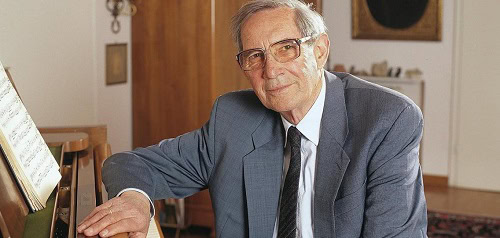
Karl Dietrich Bracher
On September 19, 2016, Karl Dietrich Bracher, a leading historian of the Nazi regime and totalitarian movements, died in Bonn, Germany, at the age of 94. He was one of the world’s greatest historians of the Nazi regime and of dictatorship and democracy in modern Europe. His connections to several generations of members of the American historical profession were strong and enduring. They included bonds with German refugee scholars of his generation, including Peter Gay and Walter Laqueur. His influence on scholarship on the collapse of the Weimar Republic, the rise of Nazism, the nature of the Nazi regime, and the Cold War was significant and will be enduring. Throughout his career, he fostered historical scholarship that drew heavily on conceptual work among political scientists working on democracy, dictatorship, and totalitarianism.
Bracher fought in the Wehrmacht’s Afrika Korps and was captured by American soldiers in 1943. He spent the remainder of World War II as a prisoner in Kansas. He returned to Germany and earned a doctorate in classics at the University of Tübingen with a dissertation on the decline and progress in the ideas of the Roman Empire. After receiving his PhD in 1948, he studied at Harvard in 1949–50. He married Dorothee Schleicher, the niece of Dietrich Bonhoeffer, the Lutheran theologian who participated in the German resistance to the Nazis and was executed in 1945. He taught at the Free University of Berlin from 1950 to 1958 and then at the University of Bonn from 1959 to 1987. From 1978, he was the co-publisher of the Vierteljahrshefte für Zeitgeschichte (Quarterly Journal of Contemporary History), the leading journal of contemporary political history in Germany.
In his first major study, Die Auflösung der Weimarer Republik: Eine Studie der Machtverfall in der Demokratie (The Dissolution of the Weimar Republic: A Study of the Collapse of Power in Democracy, 1955), Bracher drew attention to forceful antidemocratic currents, especially on the German Right, and the resulting political decisions that destroyed the Republic and brought Hitler into power. With Wolfgang Sauer and Gerhard Schutz, he probed those issues in more detail in a 1960 monograph, The National Socialist Seizure of Power: Studies in the Establishment of Totalitarian Domination in Germany, 1933–1934 (Westdeutscher Verlag, 1960). Bracher and his co-authors examined the Nazi abuses of the institutions of democracy to destroy democracy, the political blunders of their contemporaries that made it possible, and the actual seizure of power in the first year of the regime.
InDie Deutsche Diktatur (1969), Bracher offered one of the first German-language interpretations placing Hitler’s anti-Semitism and racism at the center of the Nazi policies leading to dictatorship, war, and the Holocaust. Yet as historians divided into camps focused on either right-wing or left-wing forms of totalitarianism, Bracher remained the quintessential liberal, directing his gaze at the threats to democracy from both directions. Germany’s intellectual and public life had numerous articulate and impassioned advocates for liberal democracy, but Bracher was noteworthy for his focus on “the double threat” of totalitarianism of both the Nazi and Communist variants.
Die Deutsche Diktatur was quickly translated into English as The German Dictatorship, with an introduction by the Yale historian Peter Gay. Gay called it “the first serious comprehensive history of the Nazi phenomenon” and a “masterly” synthesis. After the purges of German universities in the 1930s, then the Holocaust, there were few Jewish scholars in West German universities in the postwar decades. Bracher was among those West German historians who drew attention to Nazi anti-Semitism and the mass murder of European Jewry. In so doing, he drew on the work of Jewish scholars outside Germany, such as Hannah Arendt, Saul Friedlander, Raul Hilberg, George Mosse, Walter Laqueur, Leon Poliakov, and Gerald Reitlinger.
In the 1970s, Bracher examined the concepts of fascism, totalitarianism, and democracy in Zeitgeschichtliche Kontroversen: Um Faschismus, Totalitarismus und Demokratie (1976). He turned to the intellectual history of antidemocratic, illiberal, and totalitarian ideologies across the whole political spectrum in Geschichte und Gewalt: Zur Politik im 20. Jahrhundert (1981) (History and Violence: On Politics in the Twentieth Century) and Zeit der Ideologien (1982), published in English in 1984 as The Age of Ideologies: A History of Political Thought in the Twentieth Century. In his work of the 1970s and 1980s, Bracher defended the value of the concept of totalitarianism, as well as its applicability to Communist regimes and movements. He criticized historians who diverted attention from Hitler and his ideology toward impersonal factors such as economic interests, and who engaged in what he viewed as an inflationary use of the term “fascism” to denounce anticommunist politics.
He devoted much attention to the divisions and conflicts within Hitler’s government, yet, as he argued in “The Role of Hitler,” “it was indeed Hitler’s Weltanschauung and nothing else that mattered in the end, as is seen from the terrible consequences of his racist anti-Semitism in the planned murder of the Jews.” For Bracher, the history of National Socialism—from its beginnings in power to the Munich Agreement of 1938, the Hitler-Stalin pact of 1939, and initial disbelief that Hitler was serious about his threats to murder the Jews of Europe—could be written as the history of the underestimation of the causal import of its core ideas.
Bracher’s influence and his warm collegiality extended to my own generation of historians. Those of us fortunate to have known him experienced his kindness, gracious humor, and deep engagement as a scholar and citizen. He has left a rich legacy of published work of enduring import that will continue to find readers among a young generation of members of the American historical profession.
Jeffrey C. Herf
University of Maryland, College Park (emeritus)
This work is licensed under a Creative Commons Attribution-NonCommercial-NoDerivatives 4.0 International License. Attribution must provide author name, article title, Perspectives on History, date of publication, and a link to this page. This license applies only to the article, not to text or images used here by permission.